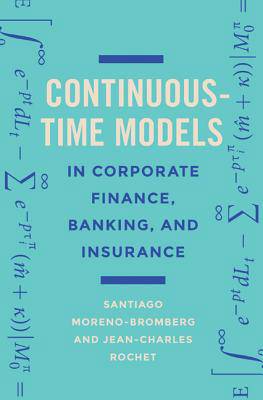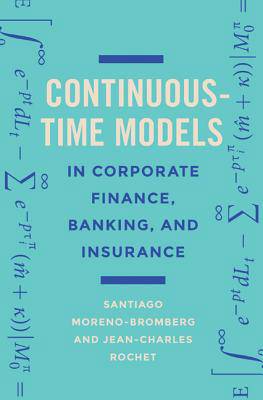
- Afhalen na 1 uur in een winkel met voorraad
- Gratis thuislevering in België vanaf € 30
- Ruim aanbod met 7 miljoen producten
- Afhalen na 1 uur in een winkel met voorraad
- Gratis thuislevering in België vanaf € 30
- Ruim aanbod met 7 miljoen producten
Zoeken
Continuous-Time Models in Corporate Finance, Banking, and Insurance
A User's Guide
Santiago Moreno-Bromberg, Jean-Charles Rochet
Hardcover | Engels
€ 69,95
+ 139 punten
Omschrijving
Continuous-Time Models in Corporate Finance synthesizes four decades of research to show how stochastic calculus can be used in corporate finance. Combining mathematical rigor with economic intuition, Santiago Moreno-Bromberg and Jean-Charles Rochet analyze corporate decisions such as dividend distribution, the issuance of securities, and capital structure and default. They pay particular attention to financial intermediaries, including banks and insurance companies.
The authors begin by recalling the ways that option-pricing techniques can be employed for the pricing of corporate debt and equity. They then present the dynamic model of the trade-off between taxes and bankruptcy costs and derive implications for optimal capital structure. The core chapter introduces the workhorse liquidity-management model--where liquidity and risk management decisions are made in order to minimize the costs of external finance. This model is used to study corporate finance decisions and specific features of banks and insurance companies. The book concludes by presenting the dynamic agency model, where financial frictions stem from the lack of interest alignment between a firm's manager and its financiers. The appendix contains an overview of the main mathematical tools used throughout the book. Requiring some familiarity with stochastic calculus methods, Continuous-Time Models in Corporate Finance will be useful for students, researchers, and professionals who want to develop dynamic models of firms' financial decisions.Specificaties
Betrokkenen
- Auteur(s):
- Uitgeverij:
Inhoud
- Aantal bladzijden:
- 176
- Taal:
- Engels
Eigenschappen
- Productcode (EAN):
- 9780691176529
- Verschijningsdatum:
- 8/01/2018
- Uitvoering:
- Hardcover
- Formaat:
- Genaaid
- Afmetingen:
- 160 mm x 234 mm
- Gewicht:
- 521 g

Alleen bij Standaard Boekhandel
+ 139 punten op je klantenkaart van Standaard Boekhandel
Beoordelingen
We publiceren alleen reviews die voldoen aan de voorwaarden voor reviews. Bekijk onze voorwaarden voor reviews.











